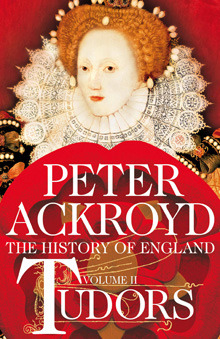Today I'm looking at a history about by far the most infamous monarchs of England, the Tudors. The sheer amount of sex and violence surrounding this family has made them irresistible to not only academic historians, but popular historians of all stripes. Whether it be the more fanciful tv series The Tudors, William Shakespeare's equally fanciful plays, or any number of other historical dramas, the lives of the Tudors have been the subject of endless examination.
Peter Ackroyd's work is competent, if a little problematic at various points. It certainly meshes with all the other information I've read about this dynasty, especially books that I read for a class that focused just on the Tudors. Since this was an audio book I couldn't look at the sources but based on the quotations he utilizes, which is sources available to many other historians, I think Ackroyd gets his facts right so I have no quibbles on that. If you're looking for information about this dynasty this is definitely worth your time and effort as a general primer. My biggest issue seems to be Ackroyd's decisions of interpretation.
My first concern was the decision to start this history with Henry VIII instead of his father, Henry VII. Henry VII gets overlooked a lot, and compared to the scandal and outrage surrounding his son it's easy to see why. Henry VII merely defeated Richard III to become king, married Elizabeth of York, and was a tight-fisted administrator and hoarder of money, leaving his son a bursting treasury when Henry VIII succeeded his father. Henry VII can definitely be a boring individual. But at the same time I feel if you choose to ignore him you're missing an important and vital part of the Tudor story. Otherwise Ackroyd goes fairly well in depth.
The biggest issue I have is Ackroyd's argument that Protestantism was responsible for turning Britain into the imperial power it became. Ackroyd claims that because Britain threw off the superstition of Catholicism, it was able to make progress while other nations like France and Spain were held back. Personally I find this to be entirely inadequate for a number of reasons. First, France and Spain remained powerful colonial and industrial rivals with Britain into the eighteenth century and France remained a powerful rival into the nineteenth century. Furthermore there were Protestant nations which challenged Britain at various points but didn't become or remain global powers. The Netherlands, for example, was a powerful colonial force and challenged Great Britain at various points, but declined in power into the eighteenth century. Sweden and Denmark were also strong Protestant states, but neither of them reached the colonial and economic power of Great Britain by any means. To claim that religion alone was responsible for Britain's greatness is definitely insufficient.
Aside from these issues, I thought this book did a pretty good job talking about England's most salacious dynasty. If you're looking for just general information this is definitely a good choice.
- Kalpar


No comments:
Post a Comment